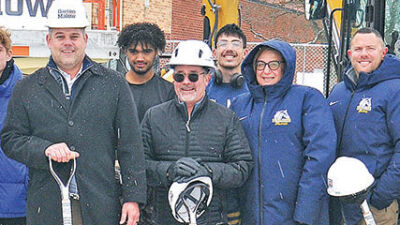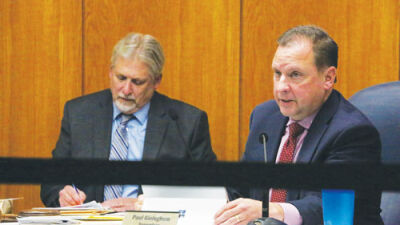CLINTON TOWNSHIP — Establishing a special assessment district for residential improvements can often be a controversial issue in a community. Residents may wonder why their taxes are going up for an improvement they may not agree with.
One recent example of this was the SAD paving on North Miles Street. The Clinton Township Board of Trustees unanimously approved a resolution for the project at its June 3 meeting, though it was not without controversy.
Four residents of the neighborhood requested the right to appeal the charges at the meeting. The residents who spoke had issues with the rollout of the improvement.
“Maybe in the future, if you’re doing something which you’re supposed to be working for us, maybe you could put it in layman’s terms so most of us can understand,” resident Debbie Johnson said. “Because a lot of people may not know why they’re here today. Maybe they thought they might stop it, maybe they won’t.”
Special assessment districts are funded by residents to make up the difference when a governmental entity lacks sufficient funds for something specific. Once approved, the governmental entity levies a tax on property owners in the district to pay for a specific improvement or service.
In the case of North Miles, Macomb County picked up half the tab, through a grant, and residents were left to pay $509,298.56. More often than not, SADs fund residential road projects but they can also fund sewer work and street light improvements. Clinton Township Treasurer Paul Gieleghem said Macomb County has $2 million in grant funds available for all townships in the county. He said townships typically get $500,000 to utilize for projects like North Miles.
The improvements for North Miles cover a 1,750-foot-long, 22-foot-wide stretch of pavement on the street. It replaces culverts and makes drainage improvements. The project spans from Little Mack Road west to 20751 North Miles Street.
Total front footage of a property determines how much residents in the district pay out in taxes for the project. For North Miles, the average front foot cost was $149.36. Residents can pay the costs up front or spread them over 10 years. The highest approximated cost for a property owner for the North Miles project is $17,910.90. Gieleghem acknowledged these costs are high.
“We need to find a way to lower the cost of these special assessment districts,” Gieleghem said. “We need money from the state dedicated to subdivision streets.”
North Miles resident Lewis Comaianni questioned last minute changes to the costs of the SAD at the June 3 meeting.
“We want to get our numbers straight because this is a lot of money,” Comaianni said. “You’re talking $17,000 for me, personally. I just retired.”
Special assessment districts were established by Michigan Public Act 51. Gieleghem explained that funds captured from the gas tax and vehicle registration fees funnel into the Michigan Transportation Fund. Through the public act, the money is then distributed to the Michigan Department of Roads (39%), cities and villages (22%) and counties (39%).
The SAD process starts with residents asking the township for an improvement in their area. Then, the township draws up the district and sends it out to engineers to get an estimate of the costs. Residents then get out a petition to help split up the costs of the improvement. Once this is done, a public hearing is held to provide information to residents before the township board votes on whether or not to approve the project. The project then goes to the Macomb County Department of roads to carry out the construction.
“Final decisions are ultimately made by the Macomb County Department of Roads,” Clinton Township Department of Public Services Director Mary Bednar explained in a video on the township’s website.
Gieleghem said residents from the community take initiative to advocate for SAD improvements. North Miles resident Greg Csernai went door to door to make sure people in the neighborhood were aware of the costs of the project. He said he did get pushback from residents when he approached them.
“Every neighbor in our neighborhood had a chance to look at the cost,” he said.
Clinton Township Supervisor Bob Cannon said that this type of debate is typical for a SAD. He said the opinions of residents about such improvements can often be split.
Cannon said one of the most difficult parts of his job is seeing neighbors mad at one another.
“I hope you’re happy with it and I hope you get along with your neighbors,” he said.
 Publication select ▼
Publication select ▼



















